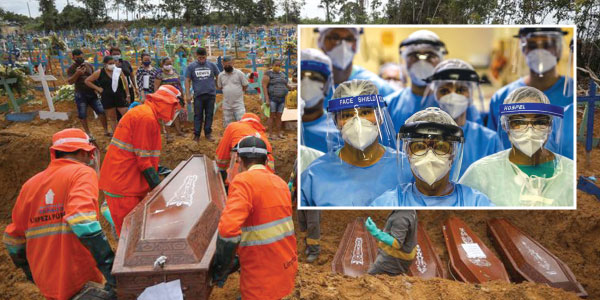
By Roberta Pardo
While the COVID-19 pandemic is receding in many parts of the world, including the United States and Europe, the pandemic is raging through Latin America and the Caribbean.
By May, the official death toll for Latin American countries combined was nearing 1 million people, though experts believe the actual number is much higher. With 8% of the global population, Latin America accounts for 35% of all COVID-19 deaths globally.
Dr. Carissa F. Etienne, Pan American Health Organization director, blamed the record-high death rates in Latin America and the Caribbean countries on the “glaring gaps” in access to COVID-19 vaccines.
As of mid-May, Etienne reported that only 3% of people in Latin America and the Caribbean had been fully vaccinated against COVID-19. By contrast, the United States has fully vaccinated more than half of American adults.
“The progress we’re seeing in the U.S. is a testament to the power of safe and effective COVID vaccines, but it underscores the vital importance of accelerating access to vaccines throughout our region, so that other countries can fully immunize their populations,” Etienne told National Public Radio. “We urgently need more vaccines for Latin America and the Caribbean, a region that has been put to the test by this pandemic.”
Latin American countries are largely reliant on COVAX for their immunization programs. The international effort purchases mass quantities of vaccine from manufacturers, then distributes them equitably to countries based on their populations. Vaccination rates vary widely by country, depending on factors such as population density, vaccine availability and health care infrastructure.
Many scientists believe the coronavirus pandemic will not be over until at least 80% of the world’s population has been vaccinated, thus highlighting the importance of increasing the availability of COVID vaccines to Latin American and Caribbean countries. The more the virus keeps spreading the more it will mutate, causing new strains to appear and prolonging the pandemic. Those eligible to get the COVID-19 vaccine should do their part and get it.
Países de América Latina y el Caribe luchan por contener el COVID-19
Si bien la pandemia del COVID-19 está retrocediendo en muchas partes del mundo, incluidos Estados Unidos y Europa, la pandemia se está propagando por América Latina y el Caribe.
En mayo, la cifra oficial de muertos en los países latinoamericanos combinados se acercaba a 1 millón de personas, aunque los expertos creen que la cifra real es mucho mayor. Con el 8% de la población mundial, América Latina representa el 35% de todas las muertes por COVID-19 a nivel mundial.
La Dra. Carissa F. Etienne, directora de la Organización Panamericana de la Salud, atribuyó las tasas de mortalidad récord en los países de América Latina y el Caribe a las “brechas evidentes” en el acceso a las vacunas contra el COVID-19.
A mediados de mayo, Etienne informó que sólo el 3% de las personas en América Latina y el Caribe habían sido completamente vacunadas contra el COVID-19. Por el contrario, Estados Unidos ha vacunado completamente a más de la mitad de los adultos estadounidenses.
“El progreso que estamos viendo en Estados Unidos es un testimonio del poder de las vacunas seguras y efectivas contra el COVID, pero subraya la importancia vital de acelerar el acceso a las vacunas en toda nuestra región, para que otros países puedan inmunizar completamente a sus poblaciones”, Etienne dijo a National Public Radio. “Necesitamos urgentemente más vacunas para América Latina y el Caribe, una región que ha sido puesta a prueba por esta pandemia”.
Los países latinoamericanos dependen en gran medida de COVAX para sus programas de inmunización. El esfuerzo internacional compra cantidades masivas de vacunas de los fabricantes y luego las distribuye de manera equitativa a los países según sus poblaciones. Las tasas de vacunación varían ampliamente de un país a otro, dependiendo de factores como la densidad de población, la disponibilidad de vacunas y la infraestructura de atención de la salud.
Muchos científicos creen que la pandemia del coronavirus no terminará hasta que al menos el 80% de la población mundial haya sido vacunada, lo que resalta la importancia de aumentar la disponibilidad de las vacunas contra el COVID en los países de América Latina y el Caribe. Cuanto más se siga propagando el virus, más mutará, lo que provocará la aparición de nuevas cepas y prolongará la pandemia. Las personas que tengan la posibilidad de vacunarse, deberían cumplir su parte y hacerlo.









